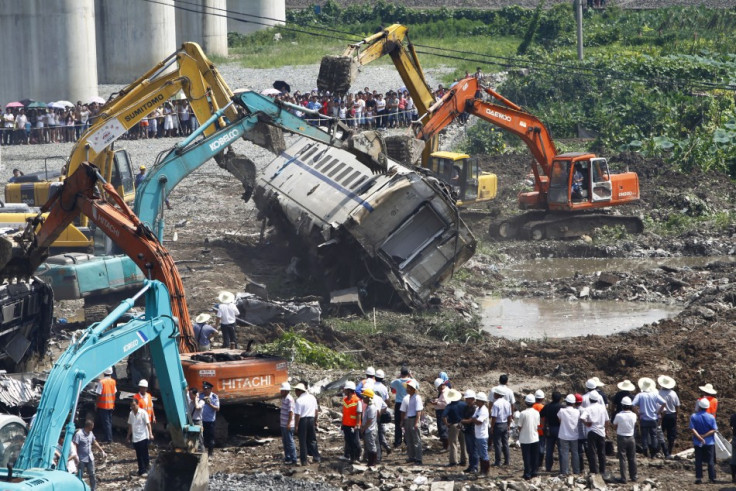Anger Against Government’s Handling of Train Collision Hits China

On Sunday, less than a day after two bullet trains collided in the south of the country, killing at least 43 people and injuring a further 210, eight mechanical diggers began to dig trenches to bury two twisted and broken train carriages.
The crash occurred on Saturday night after a bolt of lightning hit one bullet train, causing it to lose power and grind to a halt. A second train then hit it from behind, causing six carriages to derail and two to fall off the side of the elevated tracks.
Following the accident, government officials and sources assured that officials moved quickly to take charge of the situation. On Sunday morning, President Hu Jintao declared that rescue efforts were a top priority and the government also announced that three senior officials in the Railway Ministry had been fired.
Contradicting the government's narrative that all is under control, on microblogging site Sina Weibo, postings said that the transport minister, Sheng Guangzu, who took over this year when his predecessor was fired for corruption, had been cornered by angry journalists after he dodged interview requests.
Other reports on the site said the ministry was burying parts of the wrecked trains near the site, news to which locals reacted badly as they accused the government of trying to cover up the disaster and questioned how a full investigation can be carried out without an inspection of the wreckage.
People were further angered after a video emerged which appeared to show at least two bodies falling out of the carriages as they were being moved. The video became an instant online hit and has been watched over 1.2 million times in less than a day.
An online poll of more than 44,000 people showed that 97 per cent were unhappy with the government's response to the disaster, the first major tragedy on its much-vaunted high-speed rail network.
However, journalists reported that Chinese officials have instructed them not to sensationalise the accident, and fresh instructions sent to reporters yesterday said: "Do not report the accident too frequently. Report moving stories about people donating blood or taxi drivers not taking fares from victims. Do not investigate the cause of the accident."
The instructions added: "The name of the Wenzhou accident will be 'The 23 July Wenzhou Line Railway Accident'. From now on, use the headline: 'Great Love in the Face of Great Tragedy'. On television, provide the relevant information, but be careful of the music used."
Defending its decision to bury the wreckage, the Railway Ministry said the trains contained valuable "national level" technology that could be stolen and thus must be buried.
More confusion emerged over efforts to portray the accident as a natural disaster. Xinhua reported Saturday that the first train lost power when it was hit by lightning, and national television broadcasts emphasized pictures of lightning storms in the area. But later reports by Xinhua said the supposedly stalled train was under way when it was struck by the other train. Also left unexplained was why railway signals did not stop the second train before it hit the first one.
An editorial with the headline "No Development Without Safety" on People's Net, the government-run Web site affiliated with the party's leading newspaper, People's Daily, said the Railway Ministry had warned of the risks of lightning in a notice four days before the crash. It said new procedures were needed to prevent accidents while acknowledging that proper measures had not been put into effect, implying that the railway had no emergency plans for trains struck by lightning.
The editorial also read: "From public transport safety to coal mine safety to food safety, these accidents show that theoretically there is no problem with the conception of safety plans," the influential site said. "But they are not executed properly."
The train collision is one of the several high-profile public transportation accidents to affect China recently.
Early Friday morning, 41 people were killed when an overloaded bus caught fire in central Henan Province and earlier his month, an escalator at a new subway station in Beijing collapsed, killing one person and injuring 28.
Also, just last week four bridges collapsed in various Chinese cities.
Following the accidents the government issued a directive on Saturday calling for "intensified efforts in preventing major deadly accidents."
Three senior rail officials have been fired in the wake of the crash, including the head of the Shanghai railway bureau and a spokesman for China's Railways ministry, Wang Yongping, also held a press conference in which he reaffirmed China's "confidence" in its high speed rail network, which was, until the crash, a beacon of the country's technological ambitions.
© Copyright IBTimes 2025. All rights reserved.





















